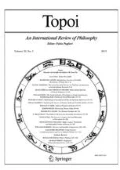Abstract
Beginning with Descartes' caution not “imprudently” to “take some other object in place of myself”, I consider first the problems of self-identification confronted by variousamnesiacs, both ordinary and Cartesian. Noting thatcogitationes as such do not individuate, I proceed to examine conclusions drawn from certain sorts of “body-switching” thought experiments. This, in turn, gives rise to a general critique of “psychological connectedness” or “unity of consciousness” as a candidate criterion of personal identity. I conclude that our ability to apply any notion of personal identity is parasitic upon the existence of a conceptual apparatus for individuating, identifying, and reidentifying objects. Finally, I argue that, if ‘person’ is a proper sortal predicate to begin with, Descartes'res cogitans cannot be understood as a species of the (metaphysical) genusres, distinct fromres extensa and only problematically in “interaction” with it. Cartesian dualism is a multiply untenable doctrine.
Similar content being viewed by others
Author information
Authors and Affiliations
Rights and permissions
About this article
Cite this article
Rosenberg, J.F. On not knowing what or who one is: Reflections on the intelligibility of dualism. Topoi 7, 57–63 (1988). https://doi.org/10.1007/BF00776209
Issue Date:
DOI: https://doi.org/10.1007/BF00776209


